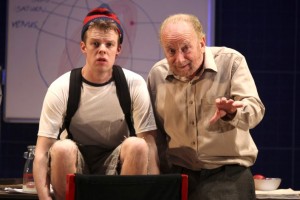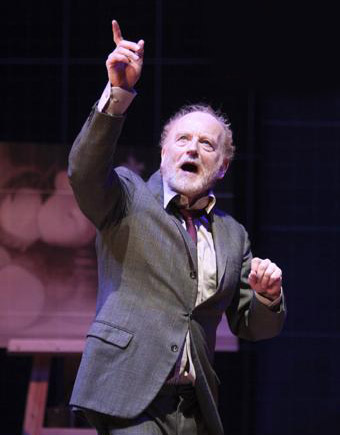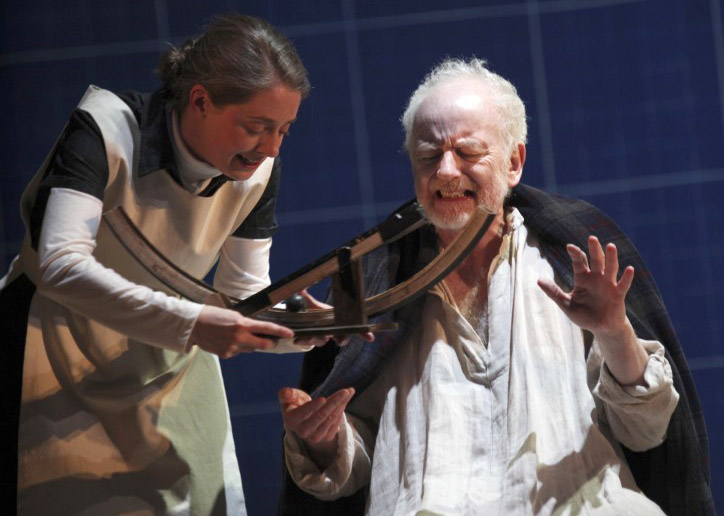Bertold Brecht’s life was dominated and defined by conflict and oppression. He was sixteen when the First World War broke out and forty-one-years-old at the start of the Second. He avoided the direct conflict in WW1 by becoming a medical student and avoided Hitler and WW2 by leaving Germany in 1933. By 1956 he was dead.
His mother was a devout Protestant, his father a Catholic. Conflict – conflict of ideas and ideology. Where Brecht avoided conflict by taking up medicine, Galileo avoided conflict by abjuring his beliefs under threat of torture from the Inquisition.
 Conflict will inevitably arise when ideas become too fixed; when ideas become idealism. Marxism and Catholicism are equally dogmatic and scientists too can get pretty hung-up on their ideas and theories.
Conflict will inevitably arise when ideas become too fixed; when ideas become idealism. Marxism and Catholicism are equally dogmatic and scientists too can get pretty hung-up on their ideas and theories.
So, is it surprising that Brecht should choose to write a play about Galileo? Did he see in Galileo a kindred spirit? Although a Marxist, Brecht was never a card-carrying Communist. Galileo also ploughed his own furrow.
It is a rare privilege to have a Royal Shakespeare Company production at the Everyman, especially with an actor of the calibre of Ian McDiarmid. To have them performing A Life of Galileo, a play by one of the most important and influential playwrights of the 20th century bodes something very special. So did it all live up to our expectations? In a word, yes.
Roxana Silbert’s astonishing production had echoes of Peter Brook. The set was very symmetrical, very angular, very scientific. The costumes were basically modern dress but with bits of historic trim. The religious characters wore full, elaborate period costume, perhaps to emphasise their importance and dominance. It is no mean feat to combine so many diverse elements in a manner that does not appear merely arbitrary, but Ms Silbert achieved a perfect balance.
 The very large cast of characters was played by a fairly large cast of actors. Everyone was excellent and I particularly liked Matthew Aubrey, as the Welsh-accented bumpkin, Andrea. He, along with the rest of the company, seamlessly managed a daunting rota of doubling. Possibly the most striking imagery was the Francis Bacon type screaming Pope arriving in his wheel chair. Easy to be fearsome when you have God and the Inquisition on your side.
The very large cast of characters was played by a fairly large cast of actors. Everyone was excellent and I particularly liked Matthew Aubrey, as the Welsh-accented bumpkin, Andrea. He, along with the rest of the company, seamlessly managed a daunting rota of doubling. Possibly the most striking imagery was the Francis Bacon type screaming Pope arriving in his wheel chair. Easy to be fearsome when you have God and the Inquisition on your side.
But, of course, it was Ian McDiarmid’s show. He shone as bright as any of the stars he gazed at. His Galileo was mischievous, enthusiastic, eccentric and likeable. (I’m not sure Galileo would have been likeable. To me he seemed to have many classic traits of a pain in the arse, but that’s another matter). You could almost hear the clockwork ticking in his brain as he moved from one theory to another, never doubting his own insights. Even though, after his abjuration on his knees before the Inquisition, he was rumoured to have muttered that “it still goes round the sun”, he was broken man, forced to live his remaining years under house arrest.
The Catholic Church was only interested in belief, proof was unnecessary and the idea that it was needed, heretical. They were concerned about how to get to heaven, not how the heavens worked. It was only in 1992 that the Pope John Paul II conceded that the Church had been wrong and that the earth does in fact orbit the sun. Only three years earlier serious cracks started to appear in communism as the Berlin Wall fell.
You are not going to get many opportunities to see a production like A Life of Galileo outside of London or Stratford so I urge you to see it while you have the chance. ★★★★★ Michael Hasted



